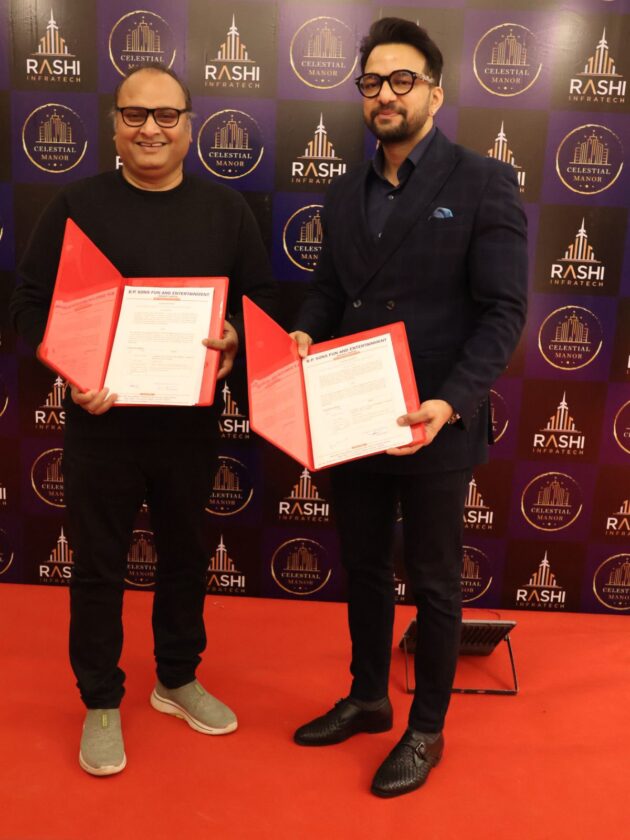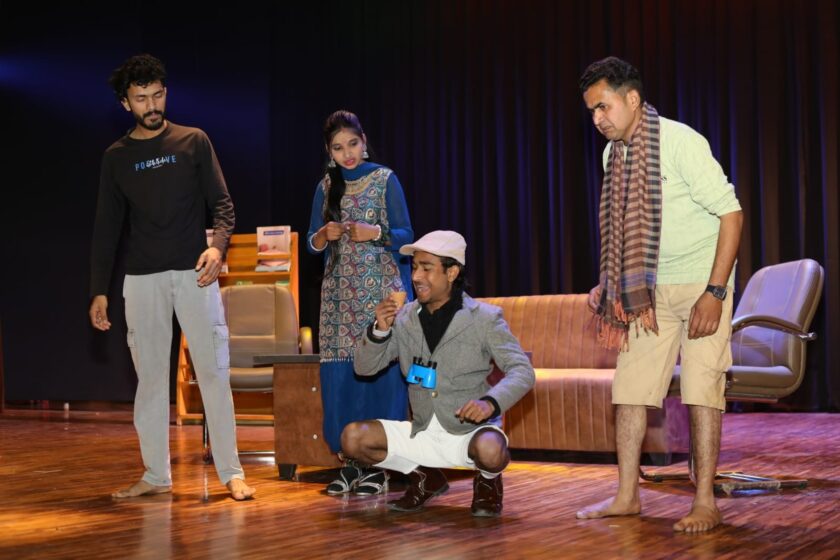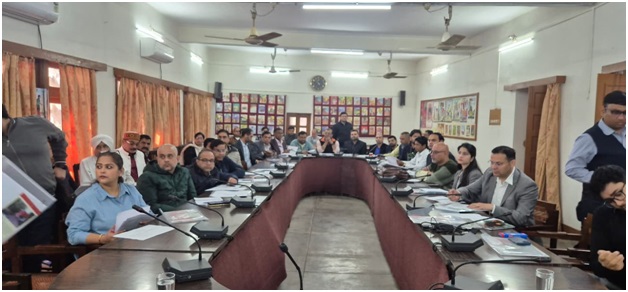Lucknow: Chief Justice of India Dr. Justice DY Chandrachud, Chief Minister of Uttar Pradesh Yogi Adityanath and judges attended the third convocation of Dr. Ram Manohar Lohia National Law University. On this occasion, Chief Justice Dr. Justice DY Chandrachud inaugurated the convocation as the chief guest. Dr. Justice DY Chandrachud and Chief Minister Yogi Adityanath ji presented medals and certificates to the meritorious students of the university.
Chief Justice expressed happiness on attending the convocation and said that this is his third visit to Dr. Ram Manohar Lohia National Law University after 09 years. In the last 02 visits, he had attended as the Chief Justice of Allahabad High Court. He said that during his tenure of about 03 years in Uttar Pradesh, he experienced that this state is the heart and soul of the country.
Our country is a country of diversity on the basis of language and region. There are different dialects in Uttar Pradesh on the basis of language and region. In such a situation, the question arises that how to take the values of justice and constitution to the people. Many times it happens that the common citizen does not understand what is being debated in the court regarding his case.
As the Chief Justice of India, he has given many such instructions, so that the judicial process can be made easier for the common people. For example, the decisions given by the Supreme Court in English are being translated into various languages mentioned in the Constitution of India, so that the common people can also understand what is written in the decision.
From 1950 to the year 2024, 3,7000 reporting judgments of the Supreme Court have been translated into Hindi. This service is free for all citizens in the form of digital SCR. Everyone must use this service. The Chief Justice said that he discusses with his colleagues and all the educationists of the country how to teach legal education in simple language.
There are some rules and basic principles in different provisions of the Constitution. We teach these principles as best as we can in English language, but we find ourselves uncomfortable in explaining those principles in regional languages. If we are not able to make the general public understand the principles of law in simple language, then it shows the lack of legal profession and legal education. This affects the common citizens, especially the weaker sections of the society.
Many legal schemes have been made in our country for the convenience of the general public. For example, if a person wants to bring his case in the court, but due to poor economic, social condition, he does not have the facility to hire a lawyer. Then the court provides a lawyer for him on its behalf. We call this the Right to Free Legal Aid in English. Similarly, if a person has a legal case and is sent to jail. If he does not have the money to hire his own lawyer, even then the process of providing him free legal aid is contained in the provisions of our Constitution.
Despite these schemes, if we cannot tell the person about his rights in simple language, then these schemes will prove incomplete. It is mandatory for every law university to establish a legal aid centre. In these centres, there is a process of providing legal services to the general public by teachers, lawyers and students. It is expected that needy people will come to these centres and they will be provided legal aid. Apart from this, many times the university’s law aid centres also organize legal aid camps in the villages around them.
The Chief Justice said that he had ordered the Research Department of the Supreme Court to analyse the measures to improve these aid centres. The Research Department conducted a survey of 81 universities and colleges of the country, in the analysis of which it was found that the general public faces difficulty in understanding the schemes related to their rights due to not knowing the English language. What is meant to say is that law is taught in English in the law university. Many times students are not able to explain the legal process in regional languages to the general public in legal aid centres. We should also keep regional languages in mind while teaching law. Dr. Ram Manohar Lohia National Law University should start undergraduate and postgraduate courses in Hindi.
The Chief Justice said that the law related to regional issues should also be explained in our universities. If a person from a neighboring village comes to the legal aid centre of your university and tells about his land related problem, but if the student does not know the meaning of Khasra and Khatauni, then how will the student be able to help that person. Land is important for people and is their source of income and livelihood. Therefore, students should also be made aware of the regional law related to land. After coming to Uttar Pradesh, I realized that their land is very important for people.
A lawyer should not be able to explain any principle in simple language. We should not do this. For this, we will have to rethink the methods of legal education. In this, we can also take the help of technology and can also expect mutual coordination among universities. Many universities together can prepare teaching modules related to the subject of law in simple and regional language. Legal principles can be conveyed to students and the general public through online videos. Regional languages should also be adopted along with English in legal education.

Chief Minister Yogi Adityanath, while welcoming the Chief Guest of the convocation, Chief Justice of the Supreme Court, Dr. Justice D.Y. Chandrachud, said that there should be rule of law in the country, after getting graduation, post graduation and research degree in law, good legal experts can become a part of the current campaign of nation building in every field of life, his inner desire towards this has given this coincidence that in this third convocation as well as in the previous two convocations, the students here have been receiving the guidance of the current Chief Justice of India, Dr. Justice D.Y. Chandrachud as the Chief Guest. His presence on this occasion makes us all happy.
Before going to the Supreme Court, the tenure of Dr. Justice D.Y. Chandrachud as the Chief Justice of Allahabad High Court has been unforgettable for the people of the state and the world of justice. Every person who believes in the world of justice appreciates it. The rule of law is the first condition of good governance. Today India is known for the rule of law. The rule of law plays a big role in changing the perception of the common people and the country and the world. Every person loves a just system. Legal experts are also very important for everyone to get justice on time.
The Chief Minister congratulated and wished the students who received the degree and said that the convocation is being held here after the last 08 years. The university has organized this third convocation keeping in mind the interests of all these students. Expressing happiness, he said that when Hon’ble Dr. Justice Chandrachud was asking the introduction of the students receiving the degree as well as about their current work, many of these degree holders told that they are providing their services at different places in the judicial field. This indicates that the path of the university is right and positive. We all have to join this initiative.
The Chief Minister said that the common people come to you with trust. In many cases like family disputes, people trust the lawyer more than the family. This trust is your biggest asset. This trust of the common citizen should always remain on the bar and the bench. Living up to it has been the biggest challenge. In the changing environment and circumstances, things like people’s ways, needs and technology change the person, society and the system. Which path should be the change depends on all of us.
By adopting a positive path, your future will be bright in every field of life along with the judicial field. The negative path will not be in your interest, nor in the interest of the society and the country. We will have to take this decision ourselves. There is an old saying that if we have to sacrifice a person for the benefit of the family, a family for the benefit of the village, a village for the benefit of the society and all these for the benefit of the nation, then we should not step back. National interest should be the highest goal of our life. When we work with this goal, then small things will not be able to affect you.
The Chief Minister said that when the Vice Chancellor of the University was reading the convocation sermon, he was referring to those lines of Taittiriya Upanishad, in which guidance has been provided to make the life and future of the graduates of India bright. ‘Satyam vad Dharmam Char’ means one should speak the truth and follow the religion. Religion is not just a method of worship. Religion is synonymous with moral values, good conduct and duties, which, unaffected by country, time and circumstances, alerts all of us towards our duties in good and bad circumstances. Working while being alert towards our duties is our religion. If we work considering the nation as a witness, then we can call ourselves the successor of the rich Rishi tradition of India, who had composed these teachings for the youth of that time, while representing them.
The Chief Minister said that even today the convocation ceremony is carried forward considering the Taittiriya Upanishad as a witness. In the ancient Guru tradition, the convocation ceremony was held in the form of a Samvartan ceremony. It used to take place before the examination. At that time, it was believed that the graduate who receives the degree will be so mature that he will be able to pass all the examinations of life easily. Today’s occasion is very inspiring for the students of this university. This is going to be an unforgettable moment of your life. Through this, the path of your future life will come out.
The program was also addressed by Chief Justice of Allahabad High Court Justice Shri Arun Bhasali. Vice Chancellor of the University Professor Amarpal Singh gave convocation advice to the students.
On this occasion, Justices of Allahabad High Court, Higher Education Minister Yogendra Upadhyay, Chief Secretary Manoj Kumar Singh, Chairman of the Law Department of the University, Professor Aditya Pratap Singh, faculty members, students and their parents were present.










